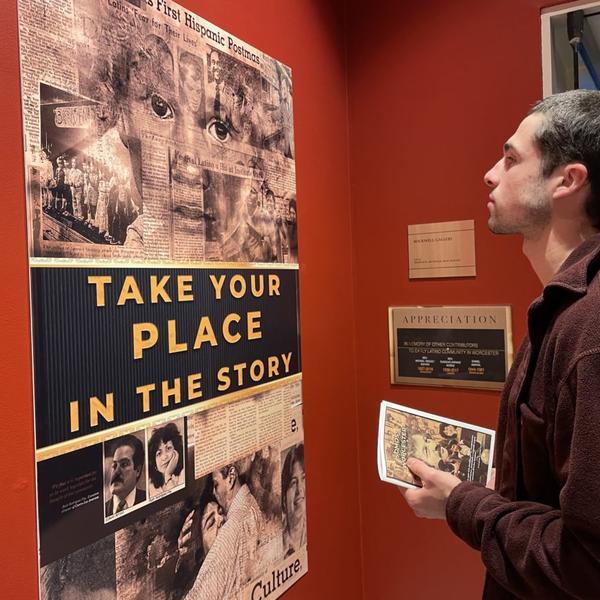The Latino connection to Worcester’s history is one of educational advancement, social justice activism and economic opportunities. For these reasons, it is vital that the Latino story is told in the community’s own words, and documented and shared in the city’s archives and museums, according to College of the Holy Cross faculty, staff and students involved in the Latino History Project initiative.
The project began in 2014 with a group of people active in the Worcester community meeting regularly to talk about the growing Latino presence in the city. They contacted William Wallace, executive director of the Worcester Historical Museum, and asked if he wanted to collaborate, and the project was launched. Rosa Carrasquillo, professor of history, and Cynthia Stone, professor of Spanish, were the first scholars to join the project. Justin Poché, associate professor of history, joined the effort a couple of years later.
“It is important to have the perspective of the Latino community in Worcester included in the city’s history,” Stone said.
The Latino History Project of Worcester has been partially subsidized since 2019 by Scholarship in Action (SIA), a Holy Cross initiative that funds and teams Worcester-based faculty research with community partners in the city. SIA, launched in 2018 through an $800,000 grant from The Andrew W. Mellon Foundation, enables Holy Cross faculty, students and community partners to collaborate via diverse projects showcasing the significant role that the liberal arts, and the humanities in particular, can play in nurturing civic engagement and partnership.
Stories to Tell
“It’s so important to create exposure and to see that Latinos are here in the city,” said Fátima Oseida '20. “There is so much more involved than any negative connotations associated with certain neighborhoods. There is a history of social justice, activism, education … this project is important to present that information and inform people about Latinos’ positive influence on Worcester.”
Oseida became involved with the project when her roommate asked to interview her for the project. Oseida and her family emigrated from Guatemala to Massachusetts in 2012, living in Framingham for a year before settling in Worcester in 2013; she graduated from the city’s North High School in 2016. During her junior year on The Hill, she became more active in the project, working as a research associate focused on cataloging and archiving the oral and video histories.
“I had been in Worcester for six years then and knew there was a large Latino population, but didn’t know much about its history. I have always felt like Worcester is home, so it was nice to talk about my experience and learn about the history of Latino activism, struggles and their vocations,” she said.
Oseida, now assistant director of the College’s J.D. Power Center for Liberal Arts in the World, continues to be active in the project, helping solicit and collect artifacts.


